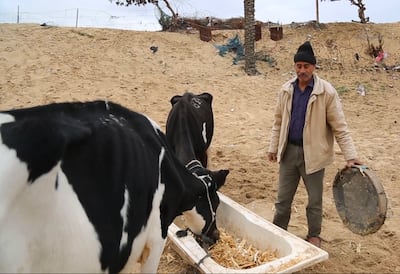Live updates: Follow the latest on Israel-Gaza
Farmers are struggling to supply fresh milk to starving Palestinians in Gaza as cows go hungry due to a lack of food, and as livestock is killed by Israeli air strikes.
Fresh milk is now a rare commodity for many of the 2.3 million Palestinians in Gaza after almost four months of war that has displaced farmers and disrupted the flow of food aid to the enclave.
"People come to ask for milk for their children, but I can't give them any because the cows don't produce enough," said Rafiq Al Dahdouh, a Gaza farmer who lost most of his animals to Israeli shelling.
Before the outbreak of the war, Mr Al Dahdouh owned 50 cows, which he reared on a farm in the east of Gaza and used to produce and sell milk.
Israel's bombardment and subsequent ground invasion destroyed his livelihood and forced him to flee.
Thirty-five of his cows were killed by Israeli shelling, he told The National, before he fled south with the remaining 15.
"Some animals [collapsed from hunger and rotted] where they fell. Those that miraculously survived then endured shelling by tanks," he said.
Like many Gazans displaced by the war, Mr Al Dahdouh is now staying in Rafah, close to the Egyptian border.
His remaining herd has been hit hard by a lack of animal feed, and he has been forced to feed the animals corn stover or hay - the only available sources of food.
"A cow needs to eat well to produce milk," he said.

Back in Gaza city, in the north of the enclave, the situation is even more dire.
Jaber Abu Ajwa is one of the few dairy farmers able to provide fresh milk to the remaining residents of the devastated city.
He used to own a herd of about 240 cows on a farm close to the border with Israel. He was forced to leave about 30 of them behind when war broke out, as they were pregnant and difficult to move. A further 80 cows have since died from starvation, while Mr Abu Ajwa decided to slaughter another 50 to sell their meat amid dwindling food supplies.
Mr Abu Ajwa is now living with his remaining cows at Al Yarmouk stadium in Gaza city, but struggling to keep them alive and healthy.
“I faced difficulties in feeding the cows, so I started to feed them hay instead of animal feed. Even if I find food for them, the prices are so high,” he told The National.
The price of a sack of hay used to be 10 shekels ($2.75) before the war, but now it costs 70 shekels ($19.25). Similarly, a sack of animal feed used to be 100 shekels, and now it costs about 300 shekels - if he is even able to find one to buy.
Mr Abu Ajwa milks his cows twice a day, at 5.30am and 3pm. Some cows used to produce about 40 litres for him, but now they average six litres. He sells a litre for about six shekels.
Like other Palestinians, he has also been forced to use some of the grain set aside for livestock to bake bread to eat.
Despite Mr Abu Ajwa's dwindling supplies, his milk is in high demand as people have no alternatives. Every day, they come from different parts of Gaza early in the morning to buy milk from him. They often wait for hours in the queue.
Zahra Auda travelled from Jabalia refugee camp to buy milk.
“I came at 3pm to get a chance to buy milk for my son,” Ms Auda told The National.
Her son, Asad, has a leg wound and fracture sustained during Israeli shelling.
“I buy the milk to help my son heal his fracture,” she added.
In Rafah, Mr Al Dahdouh appealed for more animal feed to help ease the situation.
"Why doesn't Israel send feed to Gaza for cattle, chickens, sheep and other animals?" he asked.
"The animals are innocent in this war, they are just animals."

